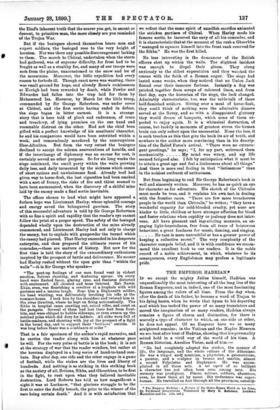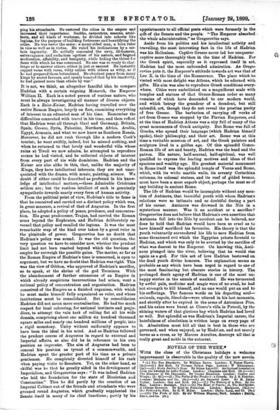THE EMPEROR HkDRIAN.* Jr we except the mighty Julius himself,
Hadrian was unquestionably the most interesting of all the long line of the
Roman Emperors, and is, indeed, one of the moat fascinating
figures among the rulers of all time. From the day when, after the death of his father, he became a ward of Trajan to his dying hours, when he wrote that hymn to his departing soul which has tasked the power of so many translators and moved the imagination of so many readers, Hadrian always remains a figure of charm and distinction, for there is scarcely a type of character to which, on one side or other, he does not appeal. Of no Emperor have we so many
sculptured remains ; in the Vatican and the Naples Museum we see bust after bust of Hadrian, showing that his peraonality seized hold in a vivid way of the world of his time. A
Roman historian, Aurelius Victor, said of him :—
" He had completely adopted the studies, the manner of life, the language, and the whole culture of the Athenians. He was a singer and musician, a physician, a geometrician, a painter, and a sculptor in bronze and marble, almost a second Polycletus and Euphranor. He was accom- plished in all these arts. A let esprit of so brilliant a character has not often been seen among men. His memory was prodigious. Places, actions, soldiers, absentees, even, he knew them all by name. His endurance was super- human. He travelled on foot through all the provinces, outstrip.
• The Emperor Hadrian: a Picture of the Greco-Roman World in his Time. By Ferdinand Graioroviue. Translated by Mary E. Robinson. London, Eamikain and Co. [1.2d„ not.]
ping his attendants. He restored the cities in the empire and increased their importance. Smiths, carpenters, masons, archi- tect, and all kinds of workmen, he divided into cohorts like legions, for the purpose of building fortresses and beautifying the cities. He was never the same : a many-sided man, a born ruler in vice as well as in virtue. He ruled his inclinations by a cer- tain ingenuity. He artfully concealed the envy, ill-humour, extravagance, and audacious egotism of his nature, and feigned moderation, affability, and benignity, while hiding the thirst for fame with which be was consumed. No one was so ready to chal- lenge or to answer others, either in jest or earnest He instantly capped verse with verse, witty Rallies with others as witty, as if he had prepared them beforehand. He obtained peace from many kings by secret favours, and openly boasted that by his inactivity, he had gained more than others by war."
It is not, we think, an altogether fanciful idea to compare Hadrian with a certain reigning Monarch, the Emperor William II. Each is a noted person of restless nature, who
must be always investigating all manner of diverse objects. Each is a Reise-Kaiser, Hadrian having travelled over the
entire Roman Empire, largely on foot, examining everything of interest to an educated man of his time. Remember the difficulties connected with travel in his time, and then reflect that Hadrian went all through Gaul and Germany, Britain, Spain, Greece, Syria, Palestine, Northern Africa, Arabia, Egypt, Armenia, and what we now know as Southern Russia. Moreover, be did not rush through like a modern Cook's
tourist ; he went swiftly, indeed, but he missed nothing, and when be returned to that lovely and wonderful villa whose
ruins at Tivoli we now admire, he attempted to reproduce scenes he had visited, and he collected objects of interest from every part of his wide dominions. Hadrian and the Kaiser are also alike in this, that, unlike the majority of Kings, they have intellectual interests, they are not unac- quainted with the drama, with music, painting, science. We doubt if either could be described as profound in his know- ledge of intellectual matters,—these Admirable Crichtons seldom are ; but the restless intellect of each is genuinely sympathetic towards nearly every form of human activity.
From the political point of view, Hadrian's title to fame is that he conceived and carried out a distinct policy which was, in great measure, a revival of that of Augustus. In the first place, be adopted a policy of peace, prudence, and concentra- tion. His great predecessor, Trajan, had carried the Roman arms beyond the Euphrates, and Hadrian deliberately re- versed that policy and recalled the legions. It was the most remarkable step of the kind ever taken by a great ruler in the plenitude of power. Gregorovius has no doubt that Hadrian's policy was sound. It was the old question, the very question we have to consider now, whether the prudent limit had not been reached beyond which the burdens of empire far outweigh the possible gains. The matter, so far as the Roman Empire of Hadrian's time is concerned, is open to argument, but we have no doubt that Hadrian was right. This was the view of Gibbon, who approved of Hadrian's sacrifice, so to speak, at the shrine of the god Terminus. With the abandonment of further extensions of an Empire in which already suspicious insurrections had arisen, went a rational policy of concentration and organisation. Hadrian conceived of the Empire as a finished organism, with which he must make himself fully acquainted as ruler, and whose institutions mast be consolidated. But by consolidation Hadrian did not mean mere centralisation. He had too much respect for local colouring, for national instincts and preju- dices, to attempt the vain task of rolling flat all his wide domain, comprising about one million six hundred thousand square miles and nearly one hundred millions of people, into a rigid monotony. Unity without uniformity appears to have been the ideal in his mind. And as Hadrian followed the prudent course of Augustus in regard to external and Imperial affairs, so also did he in reference to his own position as imperator. The aim of Augustus had been to conceal his position as tyrant of a commonwealth, and Hadrian spent the greater part of his time as a private gentleman. He completely divested himself of his rank when paying visits to Senators. Yet, on the other hand, so skilful was he that he greatly aided in the development of Imperialism, and Gregorovius says : "It was indeed Hadrian who laid the foundation for the state of Diocletian and Constantine." This he did partly by the creation of an Imperial Cabinet out of the friends and attendants who were grouped round Augustus, which gradually supplanted the Senate itself in many of its chief functions ; partly by his appointments to all official posts which were formerly in the gift of the Senate and the people. " The Emperor absorbed the whole administration," as Gregorovius says.
Aside from his politics and his intellectual activity and travelling, the most interesting fact in the life of Hadrian was his Hellenism. Captive Greece never led her conqueror captive more thoroughly than in the time of Hadrian. For the Greek spirit, especially as it expressed itself in art, Hadrian had the most unbounded admiration. As Grego- rovius puts it, the Emperor's attitude towards art was that of Leo X. in the time of the Renascence. The place which he visited with most delight was Athens, which he adorned with gifts. His aim was also to reproduce Greek conditions every- where. Cities were embellished on a magnificent scale with temples and statues of that Gra.co-Roman order so many remains of which have descended to our modern world, and whieh betray the grandeur of a decadent, but still splendid, art, though they do not reveal the pristine purity of free Greece. The barbarism of carrying off works of art from Greece was stopped by the Flavian Emperors, and at the time of Hadrian Athens was a city full of many of the great monuments of Greek antiquity. But Rome was full of Greeks, who spread their language (which Hadrian himself spoke), their philosophy, and their art. Rome was at this time a veritable museum of art, and the Greek painters and sculptors lived in a golden age. Of this splendid Grine°. Roman life of art and beauty, Hadrian was the head and the patron. His nature, half-sensual, half-spiritual, was well qualified to express the leading motives and ideas of that spacious and wealthy age. His greatest material monument in Rome itself was the splendid temple of Venus and Rome, which, with its white marble walls, its seventy Corinthian columns, its colossal statues, and its roof of gilded bronze, must have been a most superb object, perhaps the most so of any bnilding in ancient Rome.
The life of Hadrian would be incomplete without any men- tion of Antinous, that beautiful youth with whom Hadrian's relations were so intimate and so doubtful during a part of his career. Antinous was drowned in the Nile in a mysterious manner. Was it an accident or a sacrifice ? Gregorovius does not believe that Hadrian's own assertion that Antinous fell into the Nile by accident can be believed, nor does he hold that Hadrian would have been so cruel as to have himself sacrificed his favourite. His theory is that the youth voluntarily surrendered his life to save Hadrian from some threatened evil which the Egyptian priests foretold to Hadrian, and which was only to be averted by the sacrifice of what was dearest to the Emperor. On knowing this, Anti- nous plunged into the river, believing that he would rise again as a god. For this act of love Hadrian bestowed on the dead youth divine honours. The explanation seems as probable as any which have been urged in regard to one of the most fascinating but obscure stories in history. The prolonged death agony of Hadrian is one of the most un- happy stories in the annals of mankind. He was tormented by awful pain, medicine and magic were of no avail, he had not strength to kill himself, and no one would put an end to his sufferings. The famous words on his departing soul- animula, vagula, blandula—were uttered in his last moments, and shortly after he expired in the arms of Antoninus Pius, and his ashes were burnt at Cicero's villa in Puteoli, by the shining waters of that glorious bay which Hadrian had loved so well. But splendid as was Hadrian's Imperial career, the hatefulness of absolutism is written large on every page of it. Absolutism mast kill all that is best in those who are governed, and when enjoyed, as by Hadrian, and not merely borne as a cross, as by Marcus Aurelius, destroys all that is really great and noble in the autocrat.



















































 Previous page
Previous page